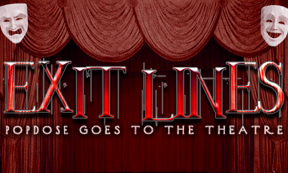 Filmmaker Martin McDonagh is enjoying his moment in the spotlight with the Oscar-nominated Three Billboards Outside Ebbing, Missouri. Here in New York, playwright Martin McDonagh is back in the footlights with Hangmen, a West End hit from 2015 that is his first new work to reach our shores since the Broadway premiere of A Behanding in Spokane in 2010. Sam Rockwell, the star of that show and Three Billboards, happened to be seated next to me at the Atlantic Theater Company, and that wasn’t the only deja vu I experienced that afternoon.
Filmmaker Martin McDonagh is enjoying his moment in the spotlight with the Oscar-nominated Three Billboards Outside Ebbing, Missouri. Here in New York, playwright Martin McDonagh is back in the footlights with Hangmen, a West End hit from 2015 that is his first new work to reach our shores since the Broadway premiere of A Behanding in Spokane in 2010. Sam Rockwell, the star of that show and Three Billboards, happened to be seated next to me at the Atlantic Theater Company, and that wasn’t the only deja vu I experienced that afternoon.
McDonagh, who won an Oscar for his short film Six Shooter in 2006, directed two features prior to his current breakthrough, In Bruges (2008) and Seven Psychopaths (2012). If you haven’t seen any of those, or his theater work, chances are you were whipsawed by his combination of jet-black humor and violence, with the addition of some off-kilter (and offputting) social content. Primed to love it, I didn’t really buy it, finding it more of a mess than anything. But it’s a hot mess, to be sure.
Hangmen is chillier. It also has the slightly stale air of leftovers. McDonagh’s assaults on theatrical propriety were continuous in the mid-90s, when he burst on the scene with The Beauty Queen on Leenane, a play that shocked and delighted me on Broadway twenty years ago and still packed a punch last year, when it was revived at the Brooklyn Academy of Music. Subsequent productions like A Skull in Connemara, The Lieutenant of Inishmore, and The Pillowman confirmed his immense talent for provocation, with the latter play (rooted not in his native Ireland but in a nameless totalitarian state) and The Cripple of Inishmaan allowing in some sentiment. After a pause, however, the U.S.-set Behanding was missing more than an appendage, with a particularly flat and irritating consideration of American racism. (This remains tin-eared in Three Billboards, with Rockwell again delivering the diatribes, with more ease this time minus a live audience; you could feel him flinching at the crude race-baiting during the show.) Hangmen is a reset, almost cozy in its return to the early, funny, horrible ones, to paraphrase the description of Woody Allen’s formative career in his austere Stardust Memories.
The show’s curtain raiser is typical McDonagh. Harry (Mark Addy), the second-greatest hangman in England, is having no end of difficulty dispatching Hennessy (Gilles Geary), who protests his innocence. Syd (Reece Shearsmith), his feckless assistant, isn’t much help, telling the condemned to stay calm and just go with the flow of his execution. Blusteringly, amusingly, the deed is done, under suspect circumstances. Black out.
Three years later Harry, out of work with the abolition of capital punishment, is running the greatest hangman-owned bar in England–err, actually, the second-greatest hangman-owned bar in England, after a rival establishment opened by the more noted Albert Pierrepoint (an actual person, played by Timothy Spall in a 2005 biopic). Pierrepoint was known for his discretion regarding his trade, but Harry, nagged at by his insecurity, holds forth with a local newspaperman at his pub, a miscalculation for numerous reasons. Not least of these is the mysterious appearance of Mooney (Johnny Flynn), an attractively louche Londoner who flirts with Harry’s wife and teenage daughter, neither terribly happy with their lot in life–and hints at knowing something about the Hennessy affair. The rest proceeds according to schedule, McDonagh-style–there’s a disappearance, a bait-and-switch, and an outrageously over-the-top resolution. Director Matthew Dunster doles out the shocks proficiently, on a pub set (by Anna Fleischle) redolent of ale and cigarettes. (The show’s humor is almost upstaged by a placard warning that real peanuts are used onstage, as if they might jump into an allergic audience member’s mouth.)
Other than the Laurel and Hardy byplay between Harry (Addy is almost unrecognizable from his role in The Full Monty) and stuttering Syd, who reenters the show, there’s nothing terribly fresh or bracing about Hangmen, which would count as a promising debut if so much Tony-level work hadn’t preceded it. (It may transfer to Broadway next season, giving him a potential fifth shot at the award.) The rage that stoked his creative fire, burning unevenly at the cinema, is banked. Hangmen doesn’t swing.





Comments